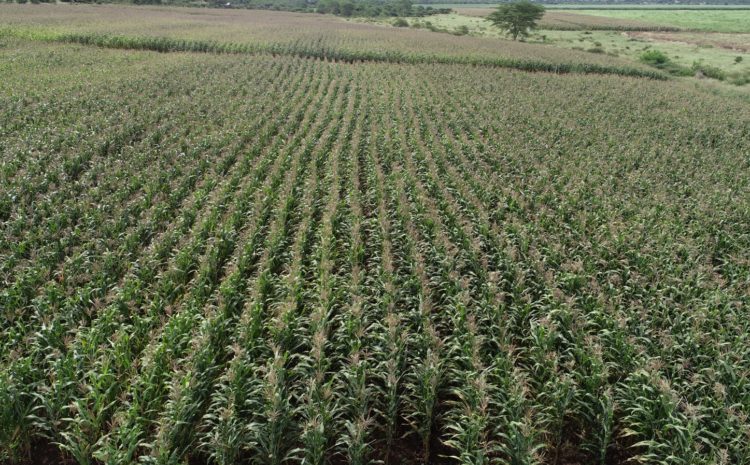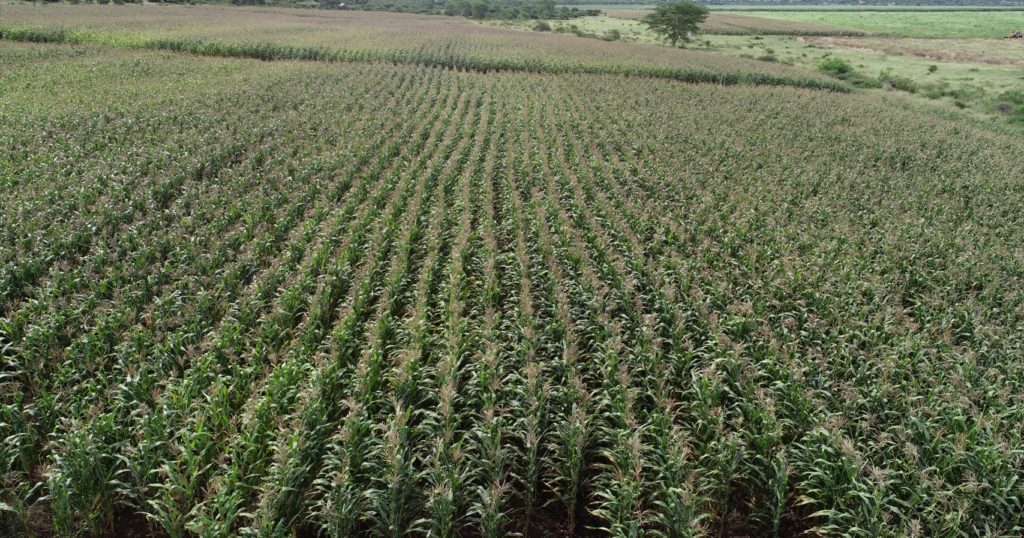
Vulematfuba Plants 12ha Maize

ESWADE has allocated 400 hectares for the production of maize and sugar beans on a rotating basis.
This project is part of the ESWADE’s Lower Usuthu Smallholder Irrigation Project (LUSIP) II project.
According to the log frame for LUSIP II, the project has budgeted to produce 400 ha of maize in rotation with beans. Currently, Vulematfuba has planted 16ha of maize. The government tasked ESWADE and NMC with producing over 30 000 metric tonnes of grain maize through the commercial maize project. The NMC is the National Maize Corporation. This project has the enormous task of assisting the country in achieving food and nutrition security through the annual production of 30 000 metric tonnes of grain maize.
Partnership
This task is to be achieved through the amalgamation of farmers under Eswatini Nation Land (ENL), commercial maize production on the government farms. For the project to be a success, the government has allocated E44 million, entrusting ESWADE with the facilitation of maize production in the country, through the commercial maize project and a partnership with NMC.
This means farmers and commercial maize producers have been afforded an opportunity to supply the government with maize, and in turn, the government would assist them through loans and further avail a market for them. The NMC is a market that has been made available to farmers as part of the commercial maize project, and they have assured that their purchasing prices have been revised. Through the commercial maize project, a revolving fund was created in 2022 to assist maize farmers with the ever-escalating cost of farming inputs, among other things. The total value of inputs disbursed to date is E5 081 337.34, which supported farmers towards the production of 5 000 metric tonnes.
ESWADE acknowledged that the government has prioritised food security in the country by making some of its farms, including Buseleni and Ngwempisi, available for maize production.
Production
The National Grains Farmers Association and the Regional Grains Associations in Shiselweni, Hhohho, Manzini, and Lubombo are involved. A total of 17 farmers (Shiselweni—8; Hhohho—5; Manzini—3; and Lubombo—1) were supported through the maize input support revolving fund. “The total value of inputs and area under production were E83,074 and 172.5 ha, respectively. Farmers were able to repay E7,666,313.30 of the total loan amount, giving the Revolving Fund a 91.3 percent success rate. Only two farmers from the Manzini and Hhohho regions were recorded as being unable to repay their loans,” he added.
The total contribution of the ENL farmers and the government farms was 778.14 metric tonnes. Based on these figures, it was clear that the farmers had the experience, commitment, and zeal to help the country achieve food and nutrition security as soon as possible.
NMC assured farmers that the market for maize will always be available in the country, and farmers should upscale production to meet the target.
Challenge
The escalating cost of farming inputs is the biggest challenge faced by farmers locally.
This has contributed to the downward trend in maize production performance for the past three years. At least 22 per cent of Eswatini’s population is projected to be living in a food shortage crisis.
Integrated
This is according to the Integrated Food Security Phase Classification (IPC) Acute Food Insecurity Analysis for June 2022 to March 2023. The shortage of maize in the country was a challenge because maize is the country’s stable food. The country had enough irrigated farms, which guaranteed that every year farmers were supposed to grow sugar cane. He said while they were still in that period, farmers could start ploughing maize that would be harvested after three months. In the past production season (2021/22), they had cautiously listened to challenges faced by farmers under ENL, including limited availability of tractors and farm implements, escalating costs of farming inputs (such as double pricing for fertiliser), delayed procurement and delivery inputs, excessive heat and delayed rainfall, pests such as fall armyworm, and post-harvest losses due to theft. To counteract some of these challenges, ESWADE committed to continuously using its experience accumulated over a period of more than 20 years working with smallholder farmers to foster increased production and productivity through technical support and farming as a business under the ENL.
Looking at the number of farmers who committed themselves, in the first cycle, a majority were from the Shiselweni Region (Sigodzi Esinamandla). This commitment from farmers has pushed ESWADE beyond its limits and required it to provide financial resources to procure a high precision four-row maize planter with a total value of close to E500 000 for the Shiselweni Farmers Grains Association.

